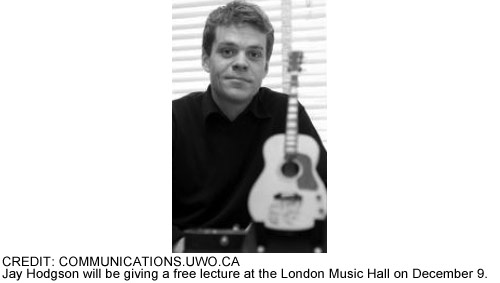Understanding the sound behind the music

"Strawberry Fields Forever to this day is like comfort food," said Dr. Jay Hodgson, professor of Popular Music at the University of Western Ontario. "Some people go have their peanut butter cookies, I have to hear Strawberry Fields."
Hodgson has a long history with The Beatles. Not only was Magical Mystery Tour the first record he ever owned at the age of five, he has devoted much of his professional career to studying their influence — not in a cultural context, but as pioneers of recording technology alongside the Abbey Road engineers and producer George Martin. Dr. Hodgson will be speaking at the London Music Club on December 9 about Martin's role in the development of such modern production techniques. But although he's now considered an expert in his field, Hodgson's aspirations didn't always revolve around academia.
"Initially, I was going to be a guitarist. I went down to Berklee (College of Music) and I fell in love with songwriting. I started playing rock more than anything else. I think I've played honestly in my life something like 1,300 gigs."
Still, something just didn't feel right to him. "I actually felt like I was stagnating as a person, to be frank. Life intervened, I fell in love and I wanted to be able to support my family and, of course, what do people do at that point in their life? They go back to school."
Hodgson didn't study pop music's politics or context, however. He studied its art, making him a target for scrutiny, particularly from the old guard of classically educated music professors.
"To this day, I constantly have to justify what I do, and that's not just in terms of the subject, but also the way I approach it." he said. "There's been this longstanding taboo on pop music and the funny thing is that it doesn't exist in other departments. You go to Media Studies or Cultural Studies or Sociology, and of course they study pop culture, why wouldn't they? The traditional methods came to the conclusion that pop wasn't worth studying."
Certainly, George Martin came from the classical stream, but as Hodgson asserts, Martin was one of the few that could still appreciate popular music of his time.
"I think to a certain extent he understood himself to be an outsider, (and) his greatest strength in understanding pop music is that it wasn't second nature to him, so things that are perfectly obvious to somebody with a pop background weren't perfectly obvious to him. So he wondered, 'Why not do this? Why not throw in a harpsichord solo?' whereas somebody in pop music, what do you do? Guitar solo, right?"
The same went for Martin's comprehension of psychedelia, something one might have thought difficult given Martin's extremely professional deameanour and reputation as a straight-laced individual.
"(The Beatles) had to sit down playing the tune acoustically, and if the song would sound, then they would proceed with production and arranging. A lot is made about how The Beatles came up with all these ideas, and it was all very psychedelic, but when you really look at what they were doing they have a really professional approach and I think that's George Martin's."
This all ties into Hodgson's motivation to give a public lecture about Martin in the first place — to give him the credit Hodgson feels he's owed.
"Engineers and producers have gotten the short end of the stick in our culture for a long time. Think about how much money John Lennon made from Strawberry Fields Forever and think about how much George Martin and (engineer) Geoff Emerick made off the track at the time, or the sort of recognition they get for really crucial contributions. We recognize the director's role in creating a movie over, say, the screenwriter's (but) you learn all the things that focus your ears on the songwriter's role in a recorded production. I think it's important for understanding who's actually doing the talking."
So hear what Dr. Hodgson's talking about, and check out his public lecture featuring demonstrations on December 9 at the London Music Club. The best part? It's free!













